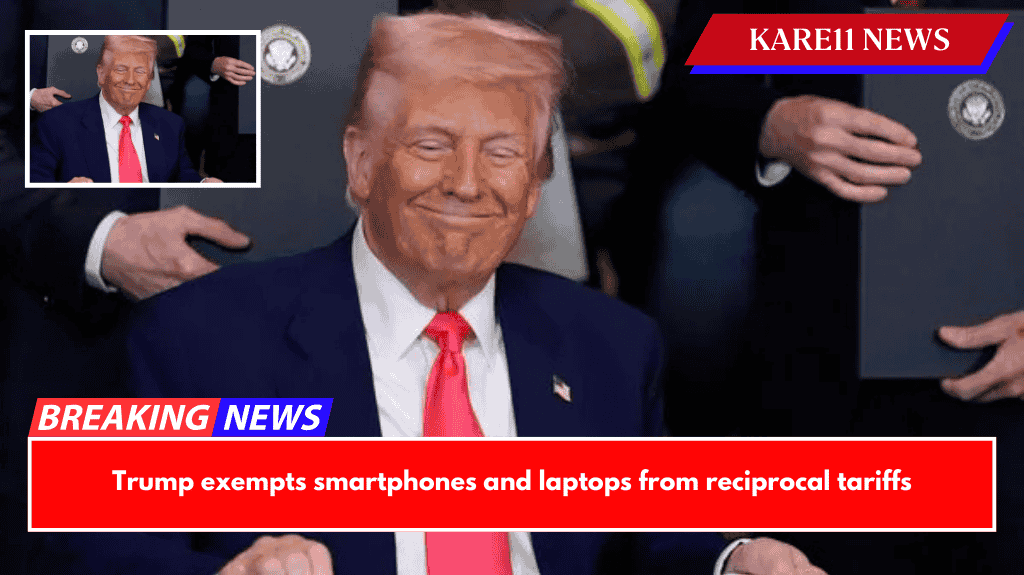WASHINGTON — The Trump administration announced late Friday that it would exempt electronics such as smartphones and laptops from reciprocal tariffs, a move that could help keep prices low for popular consumer electronics that are not typically manufactured in the United States.
It would also benefit major tech companies such as Apple and Samsung, as well as chipmakers such as Nvidia, paving the way for a possible tech stock rally on Monday.
According to US Customs and Border Protection, smartphones, laptops, hard drives, flat-panel monitors, and some chips will be exempt. Machines used to make semiconductors are also excluded. This means they will not be subject to the current 145% tariffs imposed on China or the 10% baseline tariffs elsewhere.
It’s the latest tariff change by the Trump administration, which has reversed course on its massive plan to impose tariffs on goods from most countries.
The exemption appeared to reflect the president’s recognition that his tariffs on China are unlikely to shift more manufacturing of smartphones, computers, and other gadgets to the United States anytime soon, if ever, despite the administration’s predictions that the trade war would force Apple to manufacture iPhones in the United States for the first time.
But that was an unlikely scenario after Apple spent decades developing a finely tuned supply chain in China. Furthermore, it would take several years and cost billions of dollars to build new plants in the United States, before confronting Apple with economic forces that could triple the price of an iPhone, threatening to derail sales of its flagship product.
Trump’s decision to exempt the iPhone and other popular Chinese electronics is similar to the relief he provided during his first term in office during the trade war. However, Trump began his second term seemingly determined to impose tariffs on a broader scale this time, causing a drop in the market values of Apple and other technology powerhouses.
The turmoil hammered the stocks of technology’s “Magnificent Seven” — Apple, Microsoft, Nvidia, Amazon, Tesla, Google parent Alphabet, and Facebook parent Meta Platforms. At one point earlier this week, the combined market value of the Magnificent Seven had fallen by $2.1 trillion, or 14%, since April 2, when Trump announced sweeping tariffs on a variety of countries.
Some of the losses were mitigated this past Wednesday when Trump paused tariffs outside of China, reducing the lost value in the Magnificent Seven to $644 billion, or a 4% drop from April 2. The stage is now set for another tech rally Monday when trading resumes in the US stock market, with Apple likely leading the way because iPhones made in China continue to be the company’s biggest revenue generator.
The electronics exemption should also alleviate consumer concerns that China’s tariffs would result in significant price increases on smartphones and other devices that have become essential tools of modern living.
It’s the kind of friendly treatment that the industry expected when Apple CEO Tim Cook, Tesla CEO Elon Musk, Google CEO Sundar Pichai, Facebook founder Mark Zuckerberg, and Amazon founder Jeff Bezos gathered behind the president during his Jan. 20 inauguration.
That united show of loyalty reflected Big Tech’s hopes that Trump would be more accommodating than President Joe Biden’s administration and help propel an already thriving industry to new heights.
Trump praised Apple in late February after the Cupertino, California-based company committed to investing $500 billion and creating 20,000 jobs in the United States over the next four years. The pledge echoed Apple’s $350 billion investment commitment in the United States during Trump’s first term, when the iPhone was exempt from Chinese tariffs.
The move lifts “a huge black cloud overhang for now over the tech sector and the pressure facing U.S. Big Tech,” according to Wedbush analyst Dan Ives in a research note.
In a statement issued Saturday, White House Press Secretary Karoline Leavitt did not specifically address the exemptions, but did indicate that the administration will continue to push for tech companies to relocate manufacturing to the United States.
“President Trump has made it clear America cannot rely on China to manufacture critical technologies such as semiconductors, chips, smartphones, and laptops,” Leavitt said in a statement sent via email.
She stated that the administration has secured U.S. investments from tech companies such as Apple, TSMC, and Nvidia, who are “hustling to onshore their manufacturing in the United States as soon as possible.”
Neither Apple nor Samsung responded to a request for comment on Saturday. Nvidia has declined to comment.
Liedtke contributed from Berkeley, California. Darlene Superville, an Associated Press White House correspondent in West Palm Beach, Florida, contributed to this report.


















Leave a Reply